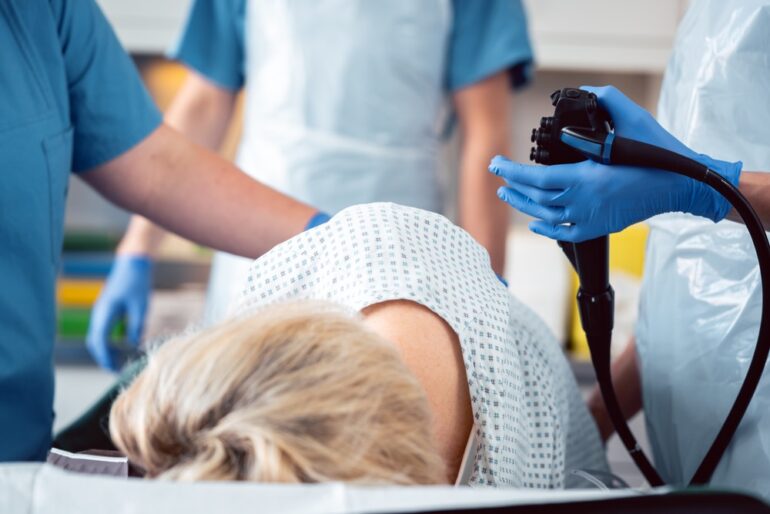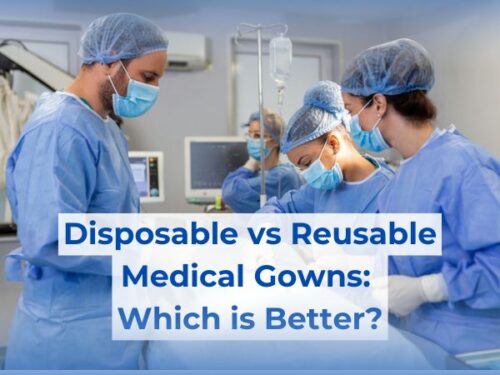If a patient experiences constant abdominal pain, anal bleeding, as well as digestive issues, the physician may suggest conducting a colonoscopy to visualize the colon in order to find out the cause of these symptoms. Inserting a tube via the anus, the inner lining of the colon can be pictured and evaluated. For this purpose, a colonoscopy prep kit is employed prior to the test to clean the colon. Let us find out what this prep kit is and how to use it properly.
What is a colonoscopy?
Colonoscopy is a procedure aimed at visualizing the internal structure of the colon and rectum in order to indicate the presence of any inflamed tissue. Ulcers and bleeding spots, inflamed surfaces, non-cancerous polyps, and colon cancer can all be identified by doing a colonoscopic procedure.
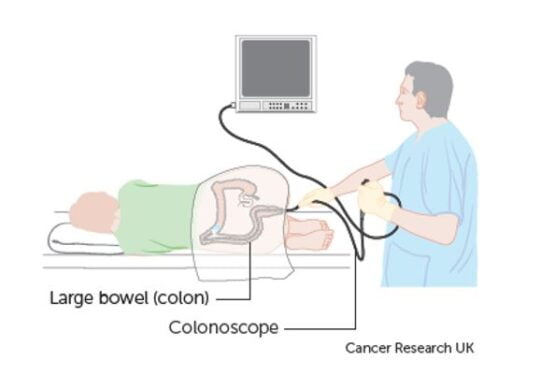
Colonoscopy
Colonoscopy prep kit
Before undergoing a colonoscopy, it is essential to clean out the colon by passing a stool. For this purpose, a colonoscopy prep or, as it is also called, a bowel prep kit is used. This colonoscopy preparation kit is a laxative formula intended to be consumed via the oral route. Once in the digestive tract, the laxatives force the gut to push any undigested food particles out of the body. This way, the gastrointestinal tract is completely emptied prior to conducting a colonoscopy.
Composition of a colonoscopy prep kit
In a bowel prep kit, there are basically two main ingredients:
- An osmotic laxative or hyperosmotic agent has the job of cleaning the GIT via increased stool formation
- Added electrolytes which maintain the body’s electrolyte balance usually disturbed by the laxative-induced diarrhea
Commonly employed osmotic laxatives in the colonoscopy prep kits include:
- Polyethylene glycol (PEG-3350)
- Sodium phosphate
In some commercially available bowel prep kits, a combination of two laxatives is made to reduce the side effects.
Side effects associated with the use of a colonoscopy prep kit
When it comes to bowel prep kit intake, some of the following side effects or demerits can also be associated with them:
- Nausea
- Dehydration
- Hypokalemia i.e. decreased potassium levels
- Hyperkalemia i.e. higher than normal potassium levels
- Hypocalcemia i.e. decreased calcium ions in the body
- Hyperphosphatemia i.e. higher levels of phosphates
- Hypomagnesemia i.e. low levels of magnesium
- Seizures (in rare cases)
How to prep for a colonoscopy?
While preparing for a colonoscopy, one should go through all the standard colonoscopy prep instructions and act accordingly. These include:
- Stop taking certain drugs such as blood thinners 7 days before the procedure.
- Eating a low-fiber diet for two to three days before the procedure.
- Shifting to a totally clear liquid diet one day prior to the colonoscopy. Completely eliminate any solid food or alcohol intake.
- Start taking the bowel prep kit as instructed by your physician (preferably in two divided doses).
- Once the intake of the bowel prep kit is done, you will need to use than bathroom a lot more than usual just like during diarrhea. Do not worry. This is normal and should happen.
- Keep checking the color of your stool until it becomes clear yellow which indicates that you are ready for the test.
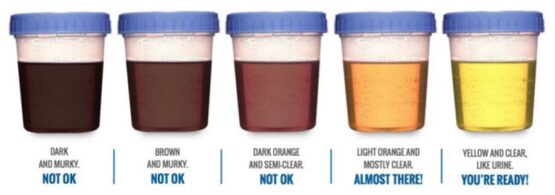
Stool colors after drinking the colonoscopy prep laxative
Food items to have before colonoscopy
Before colonoscopy, it is advised to shift to the following low-fiber foods and avoid the rest:
- Eggs
- Fruits with their skin and seeds removed
- Vegetables (properly cooked and skin eliminated)
- Fish, chicken, turkey, or veal
- Rice
- Pasta
- Peanut or almond butter
- Bread
- Bagels
- Muffins
- Rolls
Liquid foods for a day before colonoscopy
Foods that can be consumed a day before the colonoscopy include:
- Water
- Flavored water
- Chicken, beef, or vegetable broth
- Apple, white grape, lemonade, white cranberry juice, or any other juice with light colors
- Soda
- Tea
- Black coffee
- Sports drinks
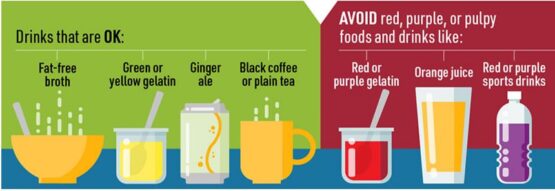
Drinks to be taken or avoided before colonoscopy
Food items to avoid before colonoscopy
While preparing for a colonoscopy, the following foods must be avoided:
- Foods high in fats
- Hard-to-digest foods such as meat
- Any kind of raw vegetables
- Fruits such as apples, berries, figs, etc.
- Cereals such as granola, bran flakes, etc.
- Vegetables such as peas, lentils, etc.
- Any type of seeds and nuts
- Foods with colored dyes particularly those with red or purple colors
Are to prone to bowel prep kit side effects?
If you have any of the following health conditions, you may be more prone to experiencing the side effects associated with a colonoscopy prep kit:
- Malnutrition
- Old age (> 65)
- Diabetes
- Inflammatory bowel disease
- History of myocardial infarction, arrhythmias, or congestive heart disease
- Liver or kidney disease
- Use of medications such as anti-hypertensive drugs, NSAIDs, etc.
Frequently asked questions about colonoscopy prep kit
- How long will diarrhea last after drinking the bowel prep kit?
As soon as you start taking your liquid dose, the diarrhea should start within 2 to 3 hours and it lasts until the colon is completely emptied. Normally, it ends before the procedure is started.
- What happens if I can’t drink all the colonoscopy prep?
In order to visualize the colonic lining properly, it is important to clear out all the food and waste debris from the colon. For this purpose, it is important to drink all of the given bowel prep kit liquid. If you cannot drink it at once, try sipping it throughout the day. Moreover, try some flavored options in the prep kits which are more palatable.
- How long before a colonoscopy should I stop pooping?
Your colon is likely to be totally clean before the morning on which the procedure is to be conducted. If your diarrhea does not stop, ask your physician who can adjust the time of the procedure until it stops.
Conclusion
A colonoscopy is one of the most commonly used procedures in hospital setups for the visualization of the colon. It is helpful for the identification of cancer or other problems associated with the colon. The process demands a clear and clean colon which can be achieved by using a colonoscopy prep kit. Available in multiple flavors and marketed by various companies, these bowel prep kits are a must to have and consume before the procedure. They are safe to use and generally have none to minimum side effects.

PhD Scholar (Pharmaceutics), MPhil (Pharmaceutics), Pharm D, B. Sc.
Uzma Zafar is a dedicated and highly motivated pharmaceutical professional currently pursuing her PhD in Pharmaceutics at the Punjab University College of Pharmacy, University of the Punjab. With a comprehensive academic and research background, Uzma has consistently excelled in her studies, securing first division throughout her educational journey.
Uzma’s passion for the pharmaceutical field is evident from her active engagement during her Doctor of Pharmacy (Pharm.D) program, where she not only mastered industrial techniques and clinical case studies but also delved into marketing strategies and management skills.










